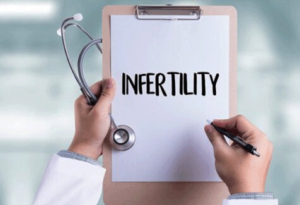
To lower your risk of infertility, make healthy choices and practice safe sex. Avoid substance abuse, maintain a healthy weight, and manage stress. Don’t delay pregnancy to counter age-related fertility decline. Regularize your menstrual cycle and monitor it closely for peak fertility health. Prioritize safe sex and get tested for STDs routinely. Consider reducing exposure to trauma, chemicals, and pollutants to protect your fertility. Taking these steps can help safeguard your reproductive health and enhance your chances of conception.
Maintain healthy weight
Maintaining a healthy weight is essential for preserving fertility and reducing the risk of infertility. Excess fat around your midsection can disrupt hormone balance and metabolism, leading to irregular ovulation and a higher chance of miscarriage in women. Both being underweight and overweight can contribute to infertility issues.

For men, engaging in moderate exercise can boost sperm production, while extreme activities like long-distance running may have the opposite effect. By keeping a healthy weight through a balanced diet and regular physical activity, you can support your reproductive health. Obesity is linked to various reproductive problems, making weight management critical for fertility.
Aim for a weight that is ideal for your body type and lifestyle to enhance your chances of conception. Take proactive steps to maintain a healthy weight, as it plays a significant role in your fertility journey.
Reduce stress and manage mood
Reducing stress levels and managing your mood are vital aspects of supporting reproductive health and reducing the risk of infertility. Ovarian function can be negatively impacted by depression and high levels of stress hormones.
To help women regulate their emotions and stress, engaging in activities like yoga and meditation on a regular basis can be beneficial. Seeking professional help through medication and therapy is also an option for individuals dealing with severe mental health issues.
Ways to Reduce Stress and Manage Mood |
Description |
|---|---|
| Practice yoga and meditation | Helps regulate emotions and stress levels. |
| Engage in regular exercise | Releases endorphins, improving mood. |
| Maintain a healthy diet | Provides necessary nutrients for mental well-being. |
| Get enough sleep | Restores energy and promotes emotional balance. |
| Seek professional help if needed | Therapy and medication can assist in managing mental health. |
Do not postpone pregnancy
Postponing pregnancy can increase the risk of infertility due to the natural decline in fertility as you age. As you get older, the number and quality of your eggs decrease, making it more challenging to conceive. Women are advised to try to conceive before the age of 35 to minimize the risk of infertility. After 35, the ovaries produce fewer healthy eggs, increasing the chances of difficulties in getting pregnant.
Additionally, the risk of miscarriage also goes up with age, emphasizing the importance of not delaying pregnancy. By being proactive and considering starting a family earlier, you can reduce the potential impact of age-related fertility decline. Keeping in mind the biological clock and understanding the changes that occur with age can help you make informed decisions about family planning and decrease the likelihood of facing infertility issues in the future.
Keep your menstrual cycle regulated
To ensure peak fertility health, it is essential to keep your menstrual cycle regular. Pregnancy hinges on ovulation, making irregular cycles a potential roadblock to conception. Menstrual irregularities often stem from ovulatory issues, which can impede fertility. Ensuring a well-regulated menstrual cycle can enhance your chances of conceiving. If you’re experiencing irregular periods, it may be beneficial to explore options such as medication to help regulate your cycle.
Monitoring your menstrual cycle closely and seeking medical advice if irregularities persist can aid in maintaining peak fertility health. Remember, a consistent menstrual cycle plays a critical role in your reproductive health. By taking proactive steps to keep your cycle regular, you are actively working towards reducing the risk of infertility and promoting your overall fertility well-being.
Keep chronic conditions under control
Guarantee that chronic conditions such as asthma, hypertension, and diabetes are effectively managed to optimize your chances of conceiving and reduce the risk of infertility. By keeping these disorders under control, you can greatly improve your fertility prospects. Make sure you attend all medical appointments and adhere to your prescribed treatment plan to enhance your overall reproductive health. Below is a table outlining the impact of managing chronic conditions on fertility:
Chronic Condition |
Effect on Fertility |
|---|---|
| Asthma | Improved chances |
| Hypertension | Reduced risk |
| Diabetes | Enhanced fertility |
Maintaining a proactive approach to managing chronic conditions not only benefits your general well-being but also plays a crucial role in increasing your likelihood of conception. Remember, a healthy body sets the stage for a successful pregnancy.
Get checked for STIs
Getting checked for STIs is essential in order to assess and address any potential risks to your reproductive health. STIs can have a significant negative impact on pregnancy. It is highly recommended to undergo preconception STI testing and treatment. Illnesses such as pelvic inflammatory disease, gonorrhea, and syphilis can lead to infertility in women. These infections may result in scarring or damage to the reproductive organs and tissues, affecting fertility.
Seeking regular STI screenings is vital for early detection and prompt treatment. By identifying and managing STIs effectively, you can reduce the risk of complications that might hinder your chances of conceiving. Take proactive steps to safeguard your reproductive health by staying informed about the importance of STI testing and working closely with healthcare professionals to address any concerns. Prioritizing your sexual health is a key element in your journey towards reducing the risk of infertility.
Avoid injury due to trauma, chemical and environmental pollutants
Regularly assess and minimize exposure to potential sources of injury from trauma, chemical, and environmental pollutants to safeguard your reproductive health and reduce the risk of infertility. Trauma, such as fights, sports injuries, or accidents, can harm the testicles leading to a decrease in sperm production. Chemicals like dioxins, organochlorine insecticides, and vinclozolin can impact male hormones, affecting fertility. Environmental pollutants can also play a role in infertility. It’s important to be cautious and avoid these harmful substances as much as possible.
Additionally, factors like wearing tight underwear or garments that lower scrotum warmth can negatively impact sperm production. Long-term activities like cycling can also cause damage to the groin area, affecting penile function and fertility. By being mindful of these potential sources of injury and taking steps to minimize exposure, you can protect your reproductive health and reduce the risk of infertility. Regularly evaluating your surroundings and habits for potential risks is vital in maintaining your fertility health.
Practice safe sex
To safeguard your reproductive health and reduce the risk of infertility, prioritize practicing safe sex. Sexually transmitted diseases (STDs) like gonorrhoea and chlamydia are common culprits of infertility. These infections can lead to pelvic inflammatory disease (PID), causing irreversible damage to the female reproductive organs. STDs can also harm men’s sperm, impacting fertility.
Regular STD testing is essential in preventing complications. Always use condoms and dental dams to protect yourself and your partner during sexual activity. These barriers act as shields against infections that can jeopardize your reproductive health. By consistently practicing safe sex, you not only reduce the risk of infertility but also promote overall well-being for both you and your partner. Take charge of your reproductive health by making safe sex a non-negotiable aspect of your intimate relationships.
Frequently Asked Questions
Can Past Sexually Transmitted Infections (STIs) Affect Fertility?
Past STIs can impact fertility. Infections like chlamydia or gonorrhea may lead to fallopian tube damage in women or blockage in men. It’s crucial to seek treatment promptly to reduce the risk of long-term fertility issues.
How Does Excessive Exercise Impact Fertility?
Excessive exercise can impact fertility by disrupting hormone levels, leading to irregular menstrual cycles or even cessation of ovulation. Listen to your body’s signals and strike a healthy balance between physical activity and reproductive health to reduce risks.
Does Using Electronic Devices Near Reproductive Organs Affect Fertility?
Using electronic devices near reproductive organs may affect fertility. Limit exposure to reduce potential risks. Be mindful of how often and how close these devices are to your body to safeguard reproductive health.
Can Certain Medications Cause Infertility?
Certain medications can cause infertility. It’s important to consult with your healthcare provider about potential risks. Medications like chemotherapy drugs, certain antibiotics, and steroids can impact fertility. Understanding these effects is vital for your health.
Is There a Link Between Poor Oral Health and Infertility?
Poor oral health has been linked to infertility. Plaque buildup and gum disease can impact reproductive health. Maintaining good oral hygiene is essential. Regular dental check-ups, brushing twice a day, and flossing can help reduce the risk of infertility.
Feel free to contact us for appointments and queries.
Mobile Phone No: 8921727906, 918547424080
Telephone Number: 0471- 2544706
Email: info@kjkhospital.com





